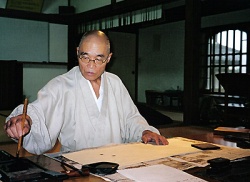Bokuseki
Revision as of 08:22, 13 January 2013 by Adminos (talk | contribs) (Created page with "thumb|250px|Shinzan Roshi Miyamae prepares a Zen calligraphy (bokuseki) '''Bokuseki''' (墨跡) is a Japanese term meaning "ink trace", and refers t...")
Bokuseki (墨跡) is a Japanese term meaning "ink trace", and refers to a form of Japanese calligraphy (Shodo) and more specifically a style of Zenga developed by Zen monks. Bokuseki is often characterized by bold, assertive, and often abstract brush strokes meant to demonstrate the calligrapher’s pure state of mind (see Samadhi). The aim in making Bokuseki is to represent ones single-moment awareness by brushing each word or passage with a single breath, ultimately realizing Zen and manifesting ones Zazen practice into physical and artistic action. Fundamentally Bokuseki is a reflection of ones spontaneous action (see: Buddha-nature, katsu) free from one’s superficial or rationally-oriented mind.
